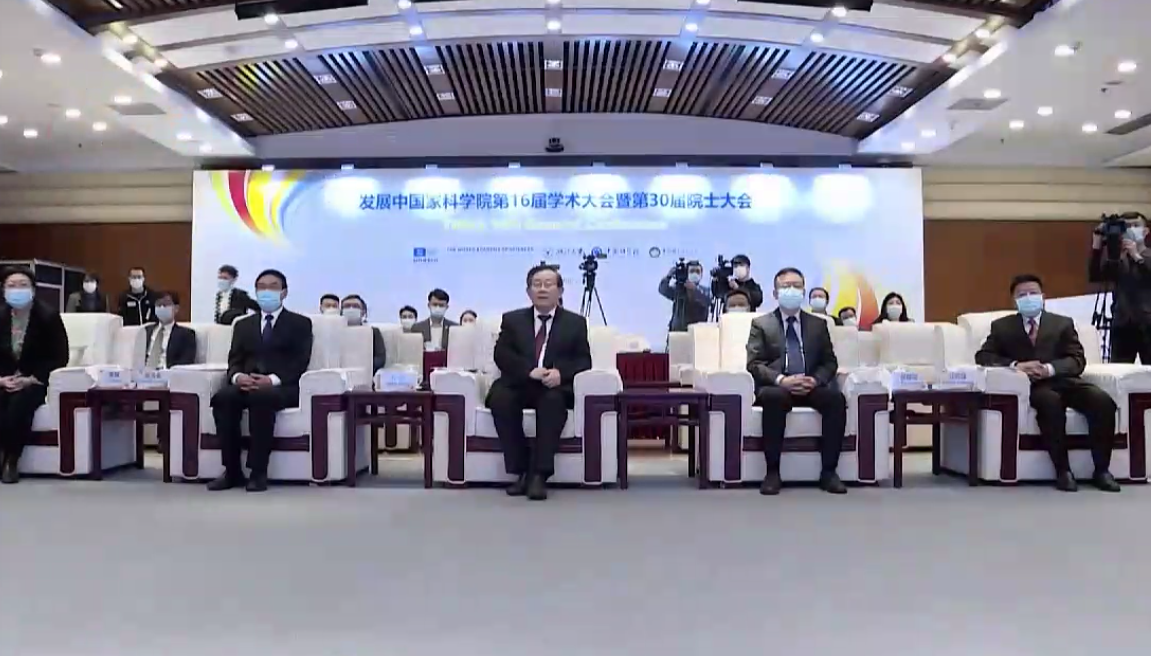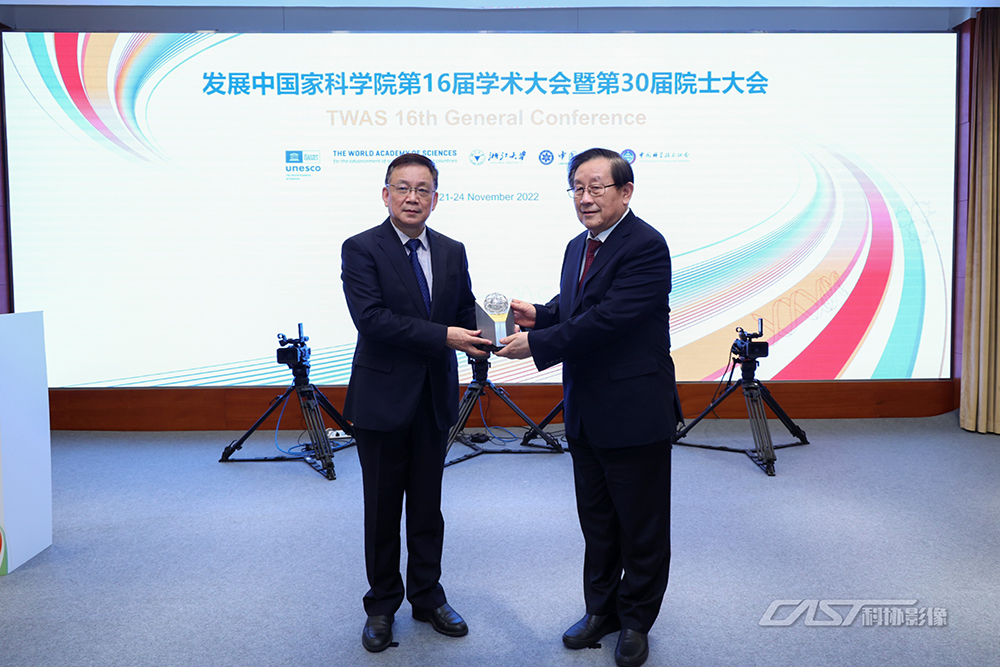 Hundreds of scientists — including TWAS fellows, TWAS Young Affiliates and Alumni, ministers of science and technology, and dignitaries from all over the world — met online today for the inaugural day of the TWAS 16th General Conference.
Hundreds of scientists — including TWAS fellows, TWAS Young Affiliates and Alumni, ministers of science and technology, and dignitaries from all over the world — met online today for the inaugural day of the TWAS 16th General Conference.
TWAS General Conferences are showcases for scientific excellence in the developing world, and highlight the importance of scientific research to human prosperity. The theme of this year’s conference is “Basic sciences for evidence-based decision-making and sustainable development in the global South”, complimenting the momentum created by the International Year of Basic Sciences for Sustainable Development, a key moment for global mobilization on a priority of great importance to TWAS.
The event normally brings its attendees together physically to the host country. But for the second time, the Academy’s capstone event was held almost entirely online to account for the ongoing COVID-19 pandemic, making it safer and simpler for many participants across the globe to take part in the event simultaneously across the world.
 Chinese President Xi Jinping sent a congratulatory letter to Conference that was read and broadcasted from the headquarters of the Conference’s host, Zhejiang University (ZJU) in Hangzhou, China. The President pointed out that China attaches great importance to the development of basic science, and is willing to work with other countries in the world, including developing countries, to further enhance the openness, trust and cooperation of the international scientific community. The ultimate aim is to benefit the people of all countries through scientific development, and contribute to promoting the Global Development Initiative, implementing the 2030 Agenda for Sustainable Development and building a community with a shared future for humankind.
Chinese President Xi Jinping sent a congratulatory letter to Conference that was read and broadcasted from the headquarters of the Conference’s host, Zhejiang University (ZJU) in Hangzhou, China. The President pointed out that China attaches great importance to the development of basic science, and is willing to work with other countries in the world, including developing countries, to further enhance the openness, trust and cooperation of the international scientific community. The ultimate aim is to benefit the people of all countries through scientific development, and contribute to promoting the Global Development Initiative, implementing the 2030 Agenda for Sustainable Development and building a community with a shared future for humankind.
Committing to TWAS and its mission
Highlights of the first day included the Opening Ceremony and Presentation of Recognitions, a session that featured addresses by high-level representatives from TWAS, UNESCO, China, Italy, Germany and the Elsevier Foundation.
TWAS President Mohamed Hassan pointed out that this event marks the 30th time the Academy has assembled for its General Meeting, and the fourth time TWAS has had the pleasure collaborating with colleagues in China to organize the event.
“I would like to take this moment to offer my deepest thanks to our partners: the Chinese Academy of Sciences, the China Association for Science and Technology, and of course Zhejiang University, which is serving as our honoured host. For their continuous and invaluable generous support, we are most grateful,” Hassan said.
“Despite the considerable challenges that we face, the future for science and sustainable development in the global South continues to hold a good deal of hope. This is an exciting time to be a part of TWAS and I encourage you all to take full advantage of the presentations and dialogue that will be taking place at this conference this week,” he added, welcoming the participants.
China’s Minister of Education Huai Jinpeng said, “On behalf of the Ministry of Education of the People’s Republic of China, I would like to extend my warm congratulations on the opening of the Conference and my special appreciation to TWAS for its outstanding contributions to promoting science, technology and innovation, cooperation and development in developing countries.”
“The world is facing changes and a pandemic both unseen in a century, [and] promoting sustainable development through science is the sure path to tackle the challenges of the century,” he added.
A message from UNESCO Director-General Audrey Azoulay stressed the fact that scientific endeavor is key for human well-being.
“Science is omnipresent and ubiquitous, from the food we eat, to the phones in our pockets. It is a driver for development, needed everywhere all the time, and everyone has the right to benefit from it. For this reason, science should know no borders, no boundaries,” read the message, which was delivered by UNESCO Deputy Director-General Xing Qu.
“The Academy has gone far and achieved so much. By providing funding and equipment it has helped to ensure the right working conditions for scientists in the global south. By nurturing the potential of young people, especially women, it has helped to create a diverse community of highly qualified scientists,” highlighted the message.
TWAS and its partners offer more than 400 PhD and postdoctoral fellowships per year to support scientists from the global South wishing to earn a doctorate or conduct postdoctoral research. It also provides more than 80 research grants per year to aid the purchase of specialized equipment and consumable supplies, and awards that are among the most prestigious given for scientific work in the developing world.
From the founding of TWAS in Trieste in 1983 to the present day, Italy has provided essential encouragement and support to the Academy. In his address, the Deputy Minister of Foreign Affairs and International Cooperation of Italy Edmondo Cirielli stressed that “the Academy promotes education, invests in knowledge and training, encourages cooperation to the benefit of developing countries and scientists’ communities at large.”
“The key issues prioritized by the United Nations in the Year of Basic Sciences for Sustainable Development are among the principles and focal points on which TWAS shapes its role in the international scientific research landscape,” he added, pointing out that basic sciences are key to the sustainable development “we owe to the future generations.”
In another address, Bettina Stark-Watzinger, Federal Minister of Education and Research for Germany, observed that guaranteeing the freedom of science is a vital development task, and that investing in the next generation of scientists will be key to allow it to overcome the major challenges it faces.
“It is great to see that TWAS has become a successful academy under the umbrella of UNESCO,” observed Stark-Watzinger, “a network for sustainability that was established for the global South, but which is making its name heard all over the world now—one that focuses on the younger generation in particular.”
Ylann Schemm, Director of the Elsevier Foundation, stressed that "the climate emergency demands action from all of us."
"We must all advocate and collaborate for action, including support for the basic sciences," she added, highlighting that TWAS and the Elsevier Foundation recently announced the winning teams for their new Project Grants Programme for Gender Equity and Climate Action. The Project was established in response to the dual need to support women's well-being through capacity-building of female scientists and respond to the causes and consequences of climate change with concrete action-based projects, under the umbrella of the “climate action” SDG. The teams are entirely led and conducted by women researchers, and the winning projects have three common themes: to address the climate-related needs of local communities; to transfer knowledge from scientific research to real-life scenarios, and to strengthen gender equity.
The Academy is also making great strides in gender parity. This year’s event celebrates in fact the election of a new TWAS Council, which for the first time has an equal number of men and women, and includes a new TWAS president, Quarraisha Abdool Karim of South Africa, who is the first woman to hold the position. More than 40 per cent of the next class of TWAS Fellows will also be women. Moreover, this is the first term the council will include a Vice-President and council member from the global North.
The opening session also included addresses from Dr. Zhang Yuzhuo, Vice-President and Chief Executive Secretary of the Secretariat of the China Association for Science and Technology (CAST); Prof. Ren Shaobo, Chair of the University Council of Zhejiang University; and Massimiliano Fedriga, President of the Autonomous Region of Friuli-Venezia Giulia.
Celebrating excellence in science
Following the opening remarks, the ceremonies continued with the traditional Presentation of Awards, Medals and Certificates by TWAS President, Prof. Mohamed Hassan, and TWAS Secretary-General, Prof. Luiz Davidovich.
Finally, attendees had the chance to hear firsthand from two world-leading scientists. Firstly, during a keynote lecture on “Building our Sustainable Future through Science and Computing” by Dr. Solomon Assefa, Vice-President of IBM Research, chaired by Prof. Winston Soboyejo, President ad interim of Worcester Polytechnic Institute, USA. Then, during a keynote lecture on “Circadian Rhythms, Gene Expression and Cell-Type Specificity of the Adult Fly Brain” by Prof. Michael Rosbash, Nobel Laureate and Professor of Biology and Peter Gruber Professor of Neuroscience at Brandeis University, USA, chaired by Prof. Yang Wei, TWAS Treasurer.
The TWAS 16th General Conference will continue until 24 November and is hosted by Zhejiang University (ZJU), in Hangzhou, China, and is organized in a virtual format in collaboration with the Chinese Academy of Sciences (CAS) and the China Association for Science and Technology (CAST).
Giovanni Ortolani

